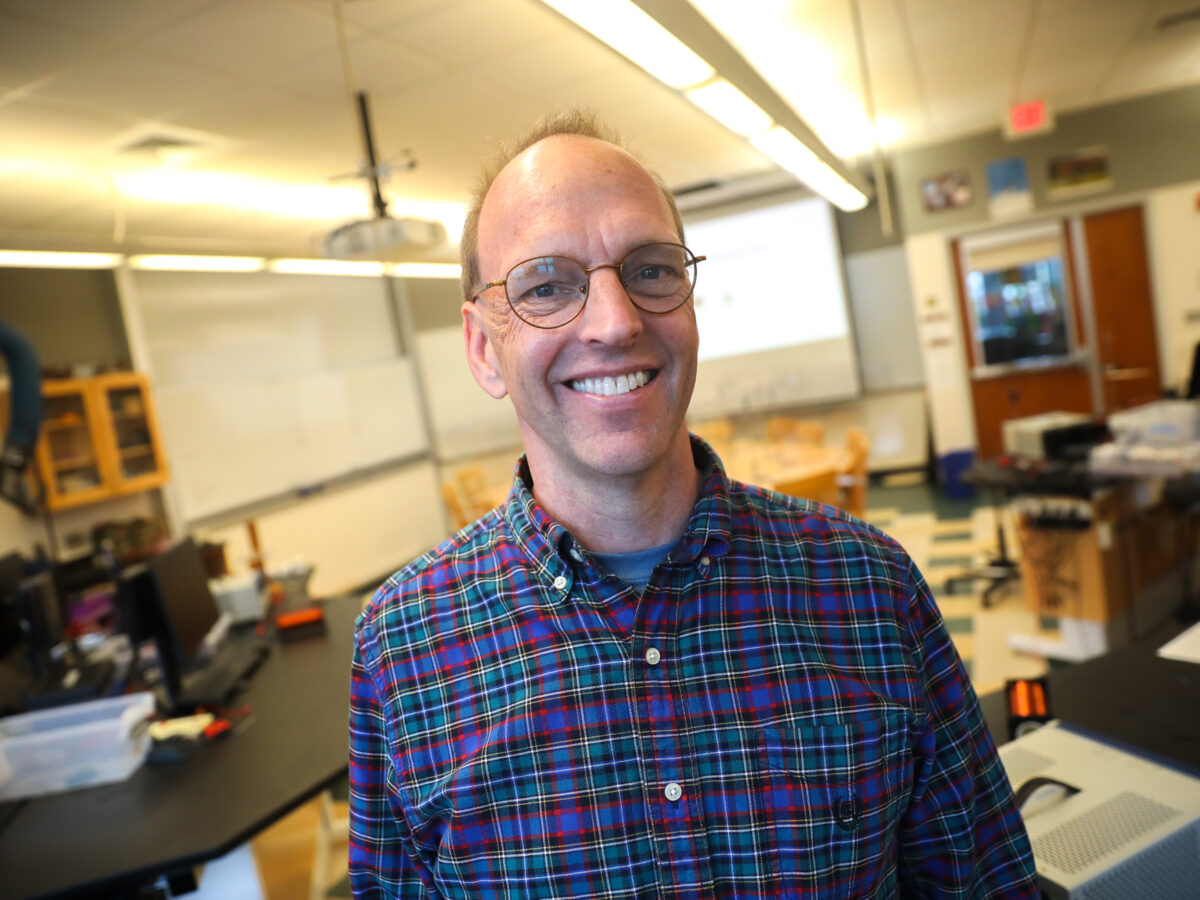Brad Robinson

When faced with the task of adopting his advanced physics course in robotics to a distance learning model amid the spread of COVID-19, Steyer Distinguished Professor Brad Robinson was skeptical. He doubted he could make such a hands-on, project-based course work remotely.
After Robinson remembered seeing a colleague playing with a small robot-building kit, he went on Amazon and ordered similar kits for each of his students. Over Zoom, the class worked on coding and building robots using the materials in the kits, sharing their screens to show progress and solve problems. “I didn’t just let them make the kit,” Robinson says. “We learned how to turn motors on and off, how to control their speed and direction, and how to use a sonar that came with the kit.”
At home on the farm in Brentwood that he and his wife, Amy, share with his 96-year-old father, Robinson cleared off a porch so he could build different mazes for the robots to navigate, using materials like lumber and black electrical tape. “The kids would send my robot their code, and then I could put it in the maze and film it,” he says. “They’d watch, then go back and work on it. It surprised me how well it worked.”
Teaching robotics in a global pandemic was far from the first new challenge Robinson has taken on since he arrived at Exeter in 1988. After teaching mainly earth science at a public high school in Vermont, he was eager for the chance to teach his real passion — physics — but wasn’t sure he would fit in at a school like Exeter. As natives of nearby Durham, he and Amy were familiar with the Academy, but weren’t sure it was for them. “Both us were like, we’re not going to live in a dorm — that’s ridiculous,” Robinson says.
He decided he would apply for the job anyway, and if he got an interview, he would at least be able to check out the physics stockroom and jot down a list of supplies. “That’ll have been worth the whole visit,” Robinson remembers thinking at the time.
As a new teacher, he was tasked with teaching electronics, a course created by the retiring instructor Dudley Taft and a subject Robinson knew little about. Robinson has taught electronics every year since, with the exception of a sabbatical year that he and his family spent traveling in Europe.
In the early 1990s, Robinson created what is now Physics 210/220/230, a series of introductory courses focused more on the concepts of physics rather than mathematics. “I had a student who said ‘Why is it that physics has to be so challenging for us who aren’t math folks? Why can’t we have something different?’” Robinson recalls. “I didn’t have a good answer for her, and I decided we should have an alternative.”
Outside the classroom, Robinson and his wife did embrace dorm life, first in Webster and later for many years in Dow House. Around 1998, they moved to the farm with their two children, Hannah Herklotz ’05 and Silas Robinson ’08.
Robinson has enthusiastically coached prep crew for the majority of his time at Exeter, though the prep program was put on hold during the pandemic. COVID also put a (hopefully temporary) stop to one of Robinson’s other extracurricular activities — playing guitar in a group focused on contra dance, a form of communal folk dancing popular in colonial America that enjoyed a revival in the 1960s. Along with his fellow Science Instructor Jim DiCarlo, Robinson helped establish a longstanding monthly gathering open to students as well as the larger Exeter community.
From the classroom to the boathouse to the contra dance floor, creating his own brand of warm, welcoming community has helped Robinson feel at home at Exeter, despite his long-ago reservations. “This has been an amazing place to raise a family and to work,” he says. “When I applied here to check out the stockroom, I had no idea that this would evolve into what it’s been. I feel really lucky.”
— Sarah Pruitt ’95
Brad Robinson was appointed a Steyer Distinguished Professor in June 2020. Endowed by Kat and Tom Steyer ’75 in 2006, the Steyer Distinguished Professorships honor Exeter’s most accomplished senior teachers who set the standards for scholarship and teaching at Exeter.


